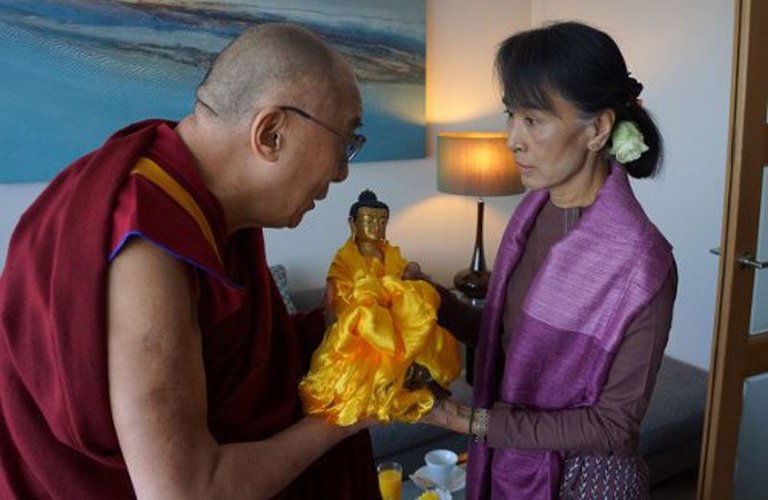St Hugh’s puts portrait in storage after international criticism over Myanmar leader’s role in her country’s humanitarian crisis
The portrait of Aung San Suu Kyi was painted by Chen Yanning.
The portrait of Aung San Suu Kyi was painted by Chen Yanning. Photograph: Chen Yanning/St Hugh's college, Oxford University
View more sharing options
Shares
7295
Comments
484
Richard Adams Education editor
Friday 29 September 2017 18.02 BST Last modified on Saturday 30 September 2017 06.06 BST
The Oxford college where Aung San Suu Kyi studied as an undergraduate has removed her portrait from public display and placed it in storage, in a move that follows international criticism over her role in Myanmar’s humanitarian crisis.
The governing body of St Hugh’s college decided to remove the painting of the Nobel laureate from its main entrance on Thursday, days before the start of the university term and the arrival of new students.
In 2012 Aung San Suu Kyi was celebrated with an honorary doctorate from Oxford University, and held her 67th birthday party at the college where she studied politics, philosophy and economics between 1964 and 1967.
The Guardian view on the slaughter in Myanmar: a crime against humanity
Editorial: The brutal, bloody, and ultimately pointless mistreatment of a Muslim minority shames Aung San Suu Kyi
Read more
But in recent months Myanmar’s leader has attracted increasing criticism for her apparent defence of the country’s treatment of its Rohingya minority, who have suffered ethnic cleansing and violent attacks by Myanmar’s military forces.
In a statement St Hugh’s said: “The college received the gift of a new painting earlier this month which will be exhibited for a period. The painting of Aung San Suu Kyi has, meanwhile, been moved to storage.”
St Hugh’s student newsletter, The Swan, said the decision to remove the portrait was taken by the college’s governing body, which includes the college’s fellows and its principal, Dame Elish Angiolini.
But the move by St Hugh’s was described as cowardly by the Burma Campaign UK group, which urged the college to go further.
“This seems a rather cowardly action by St Hugh’s. If they have taken down the portrait because of Aung San Suu Kyi defending the Burmese military as they commit ethnic cleansing against the Rohingya they should say so and write to her urging her to respect human rights,” said Mark Farmaner, the campaign’s director.
Advertisement
The portrait, painted by the artist Chen Yanning in 1997, belonged to Aung San Suu Kyi’s husband, the Oxford academic Michael Aris. After Aris’s death in 1999 the portrait was bequeathed to St Hugh’s, and hung near the college’s main entrance on St Margaret’s Road in north Oxford.
The college’s other notable alumni include Theresa May, Nicky Morgan, the former education secretary, and Barbara Castle, a cabinet minister in Harold Wilson’s Labour governments.
As a leader of Myanmar’s opposition, Aung San Suu Kyi won a Nobel peace prize in 1991. Despite being barred from running for president, she won a decisive victory in the country’s 2015 election, and was eventually given a title of state counsellor.
As prime minister, May has been under pressure to take action after evidence emerged that Myanmar’s military forces were driving hundreds of thousands of Rohingya out of the country.
Earlier this month May said: “Aung San Suu Kyi and the Burmese government need to make it very clear that the military action should stop.”
Oxford council is to vote next week on stripping Aung San Suu Kyi of the freedom of the city it bestowed on her in 1997, when she was being held as a political prisoner by Myanmar’s military junta.
So far Oxford University has decided not to reconsider Aung San Suu Kyi’s honorary degree. But last week the university expressed its “profound concern” over the treatment of the Rohingya, a Muslim ethnic minority.
The university said it “hopes the Myanmar administration, led by Oxford alumna Aung San Suu Kyi, can eliminate discrimination and oppression, and demonstrate to the world that Myanmar values the lives of all its citizens”.
Since you’re here …
… we have a small favour to ask. More people are reading the Guardian than ever but advertising revenues across the media are falling fast. And unlike many news organisations, we haven’t put up a paywall – we want to keep our journalism as open as we can. So you can see why we need to ask for your help. The Guardian’s independent, investigative journalism takes a lot of time, money and hard work to produce. But we do it because we believe our perspective matters – because it might well be your perspective, too.
I appreciate there not being a paywall: it is more democratic for the media to be available for all and not a commodity to be purchased by a few. I’m happy to make a contribution so others with less means still have access to information.
Thomasine F-R.
If everyone who reads our reporting, who likes it, helps to support it, our future would be much more secure.